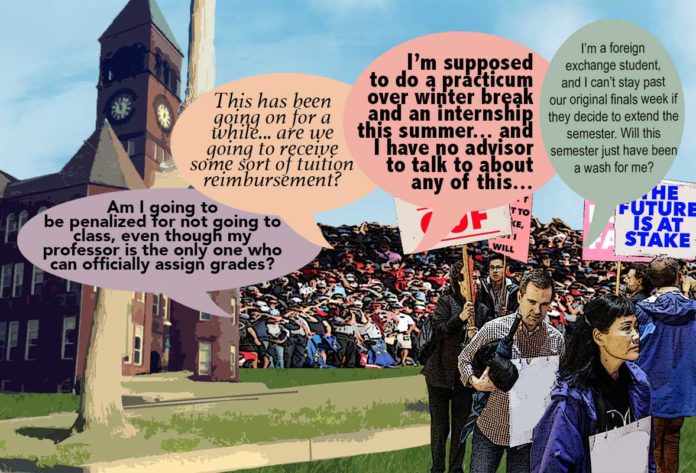Although the current contract negotiations are taking place between two main groups, APSCUF and PASSHE, students are just as affected as faculty by the possibility of a strike and the current proposals on the table.
One point made by members of APSCUF throughout the ongoing negotiations is that they are fighting for the students, and from information that has been released, this is true. The state previously had multiple plans in the proposals to have graduate students teach classes, have adjunct (temporary) faculty teach more classes and seemingly force students into taking online classes. So far, the graduate students teaching classes has been taken off the table, but the other two remain.
Adjunct faculty teaching more classes may not seem to put a burden on students but the quality of the education would be downgraded. This is not because of lack of credibility of experience from the adjunct, but the fact that many of these faculty are working on their PhD’s or other projects to increase their expertise, and by teaching more classes they may get burned out, meaning their classes would likely be affected, thereby affecting the education of students.
Online classes themselves are not a bad thing, and sometimes provide a way for students to make up for lost time by taking an online class over a break, or an additional class if they have enough time. The current proposals would encourage this behavior though, and from what APSCUF members have been saying, the state seemingly wants to force students to take online classes. This would be a detriment for some students, who prefer face-to-face classes and interactions with professors. Making these students take online classes could hurt what they are getting out of their years at the university.
While concern may come from the students hearing about the current proposals being discussed, the possibility of a strike creates even more anxiety. From the university standpoint, details have been slim. Students have been told that classes and university services would stay open but have not been given specific details, which makes the situation somewhat worrisome. Students don’t know who would fill in to teach the classes or if the person who does fill in would even be qualified.
Looking over FAQ’s from the state system also prove to be lacking substance. This lack of specific information affects the students by making them worry, with some students enrolled in Physician’s Assistant program worried about the program losing its accreditation, meaning they could be without a program at a university they picked for the program itself.
Some students who get paid for clubs or other organizations also don’t know if they’ll continue to get paid, creating a financial problem for some students who likely rely on that payment to make ends meet.
Tuition reimbursement is another issue students could face if a strike is prolonged. While President Norton recently said at an SGA meeting that tuition would be reimbursed, the process through which this is done could be complex, making it a hassle for students.
One APSCUF informational meeting in the past mentioned that students are paying 75 percent of operating costs for the university through tuition and other fees, with the state only providing 25 percent of the costs. Various times throughout these informational meetings, and from APSCUF President Kenneth Mash himself, it has been said that Pennsylvania is lacking funding from the state, forcing more of a burden on students. While students may just brush off the tuition increases as a necessary evil, they need to realize that there are 100,000 of them in the state system, and each has a voice.







